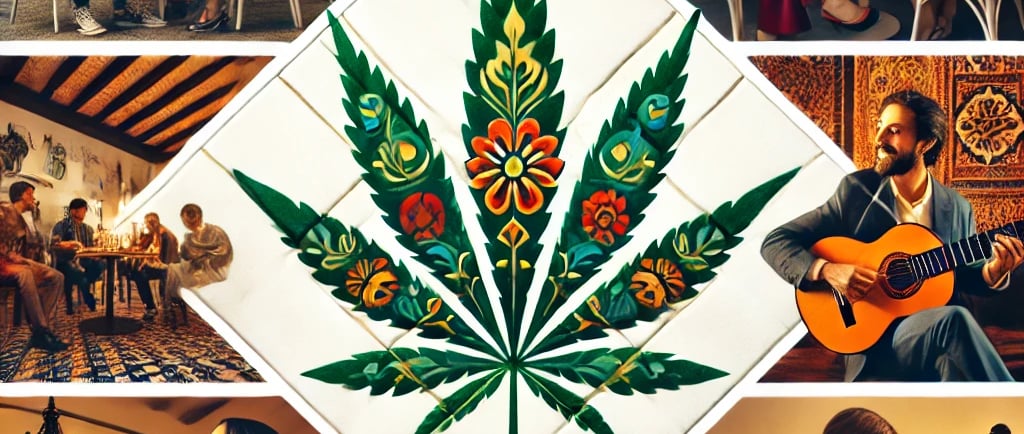Cannabis Clubs in Spain: A Unique Social Movement in 2024
Spain's cannabis clubs are a distinct and integral part of the country's cannabis culture. These clubs, often referred to as cannabis social clubs, have become central to the way cannabis is consumed and experienced in Spain. They provide a unique model of responsible cannabis use that blends community, social activism, and a love of the plant. This article explores the history, functioning, and impact of cannabis clubs in Spain, examining how they shape the cannabis landscape and influence the broader movement for legalization.
CANNABIS CLUBS
9/8/20245 min read


1. The Origins of Cannabis Social Clubs in Spain
Cannabis social clubs emerged in Spain in the early 2000s as a response to the country’s decriminalization of personal cannabis use and cultivation. The idea was inspired by Spain’s rich tradition of social clubs and collective organizations, which have historically played a significant role in Spanish society. These clubs provide a way for cannabis enthusiasts to come together, cultivate cannabis, and consume it in a private, regulated environment.
The founding principles of cannabis social clubs are based on non-profit operation, collective cultivation, and responsible consumption. Members of a club contribute to the cost of growing cannabis, which is then shared among them. This model allows members to access high-quality cannabis without resorting to the black market, promoting a safe and community-oriented approach to cannabis use.
The first cannabis social clubs were established in Catalonia, with Barcelona quickly becoming the epicenter of the movement. Today, there are hundreds of cannabis clubs across Spain, from major cities to smaller towns, each offering a unique atmosphere and community. The clubs vary in size, membership, and focus, but all operate under the common goal of providing a safe and legal space for cannabis consumption.
2. How Cannabis Social Clubs Operate
Cannabis social clubs operate under a set of guidelines that prioritize safety, privacy, and compliance with the law. To become a member of a club, individuals typically need to be sponsored by an existing member and must meet certain requirements, such as being of legal age and committing to responsible cannabis use. Once accepted, members pay a membership fee that covers the cost of cultivation, maintenance, and club operations.
The cultivation of cannabis takes place on behalf of the members, either at the club’s premises or at a separate growing location. The amount of cannabis produced is based on the number of members and their estimated consumption needs, ensuring that production remains within reasonable limits. The cannabis is then distributed among members, who can consume it within the club's private space or take it home for personal use.
Clubs are typically designed to offer a comfortable and social environment, with areas for members to relax, socialize, and enjoy cannabis. Many clubs feature lounges, bars, and entertainment spaces, creating a welcoming atmosphere for members. In addition to providing cannabis, clubs often host events, workshops, and cultural activities, fostering a sense of community and promoting cannabis education.
3. Legal Status and Challenges
While cannabis social clubs operate legally within the framework of decriminalization, they exist in a legal gray area. Spanish law allows for the personal use and cultivation of cannabis in private spaces, but the commercial sale and public consumption of cannabis are prohibited. Cannabis social clubs navigate this ambiguity by functioning as private, non-profit associations that limit cannabis consumption to their members.
Despite this, clubs have faced legal challenges and scrutiny from authorities. Some clubs have been accused of exceeding the boundaries of personal use, engaging in activities that resemble commercial sales, or operating without proper registration. To address these concerns, many clubs work closely with legal advisors and adhere to strict guidelines to ensure compliance with the law.
The lack of a clear legal framework for cannabis social clubs creates uncertainty for both club operators and members. Advocates for legalization argue that establishing clear regulations for cannabis clubs would provide a more stable and transparent environment, protecting the rights of cannabis users and reducing the risks associated with the gray market.
4. Cannabis Clubs as a Social Movement
Cannabis social clubs are more than just places to consume cannabis—they are a social movement that advocates for cannabis rights, responsible use, and community engagement. Clubs are often involved in activism, lobbying for legalization, and participating in public debates about drug policy. They serve as a platform for raising awareness about the benefits of cannabis, challenging stereotypes, and promoting a positive image of cannabis users.
Many clubs emphasize the importance of education, offering workshops and seminars on topics such as cannabis cultivation, the endocannabinoid system, and the legal landscape of cannabis. By providing members with knowledge and resources, clubs empower individuals to make informed decisions about their cannabis use and advocate for their rights.
Cannabis clubs also play a role in social responsibility, supporting initiatives related to health, sustainability, and social justice. Some clubs engage in charitable activities, partner with local organizations, and promote environmental sustainability by using eco-friendly cultivation practices. These efforts contribute to the broader social impact of cannabis clubs, demonstrating that cannabis culture can be a force for positive change.
5. The Role of Cannabis Clubs in Tourism
Cannabis social clubs are a significant draw for cannabis tourists visiting Spain. Tourists are often attracted to the opportunity to experience cannabis in a legal and social setting, and cannabis clubs offer a unique alternative to the more commercialized cannabis markets found in other countries. Cities like Barcelona, Madrid, and Valencia have become popular destinations for cannabis tourists, thanks to their vibrant club scenes and relaxed attitudes towards cannabis use.
To cater to tourists, some clubs offer temporary memberships, allowing visitors to access the club's facilities and enjoy cannabis during their stay. These memberships are usually limited to a specific duration, ensuring that the clubs maintain their private, non-commercial status. Cannabis-friendly accommodations and guided tours also support the cannabis tourism industry, offering visitors a complete experience that includes visits to clubs, local attractions, and cannabis-related businesses.
The growing popularity of cannabis tourism presents both opportunities and challenges. While it contributes to the local economy and promotes cultural exchange, it also raises concerns about public perception, regulation, and the impact on local communities. To address these issues, clubs and tourism operators must prioritize responsible practices, respect local laws, and engage with the community to ensure a positive impact.
6. The Future of Cannabis Social Clubs in Spain
The future of cannabis social clubs in Spain is closely tied to the broader debate about cannabis legalization. As public opinion shifts and calls for legalization grow louder, cannabis clubs are likely to play a key role in shaping the future of cannabis policy in Spain. Their model of collective cultivation, non-profit operation, and responsible use offers a blueprint for a regulated cannabis market that prioritizes safety, community, and social responsibility.
If cannabis is fully legalized in Spain, cannabis social clubs could evolve into licensed establishments that operate within a regulated framework. This would provide greater legal certainty for clubs, protect the rights of cannabis users, and support the development of a safe and sustainable cannabis industry. Legalization could also lead to the expansion of cannabis clubs, attracting more members and contributing to the growth of the cannabis tourism market.
As the movement for cannabis legalization continues, cannabis social clubs will remain at the forefront, advocating for a fair and inclusive approach to cannabis policy. By promoting education, community engagement, and responsible use, cannabis clubs are helping to pave the way for a future where cannabis is accepted as a normal and positive part of society.
You can find top cannabis clubs in Valencia here
Conclusion
Cannabis social clubs are a unique and influential aspect of Spain’s cannabis culture, offering a model of responsible and community-oriented cannabis use. As both social spaces and advocates for change, these clubs play a vital role in shaping the cannabis landscape in Spain. Their existence reflects the country’s progressive approach to cannabis and the growing acceptance of the plant as part of everyday life.
The future of cannabis social clubs in Spain is full of possibilities, with the potential to contribute to a more regulated and inclusive cannabis market. By continuing to advocate for cannabis rights, promote education, and foster community, cannabis clubs are not only shaping the future of cannabis in Spain but also setting an example for other countries to follow.
